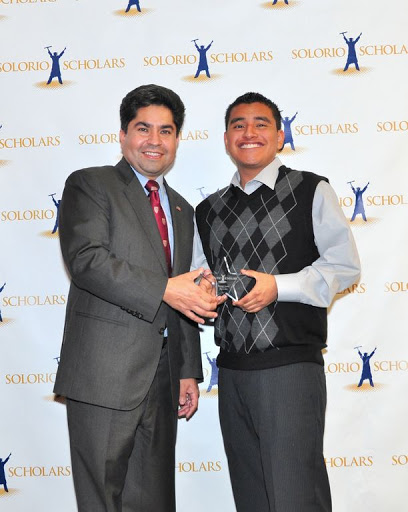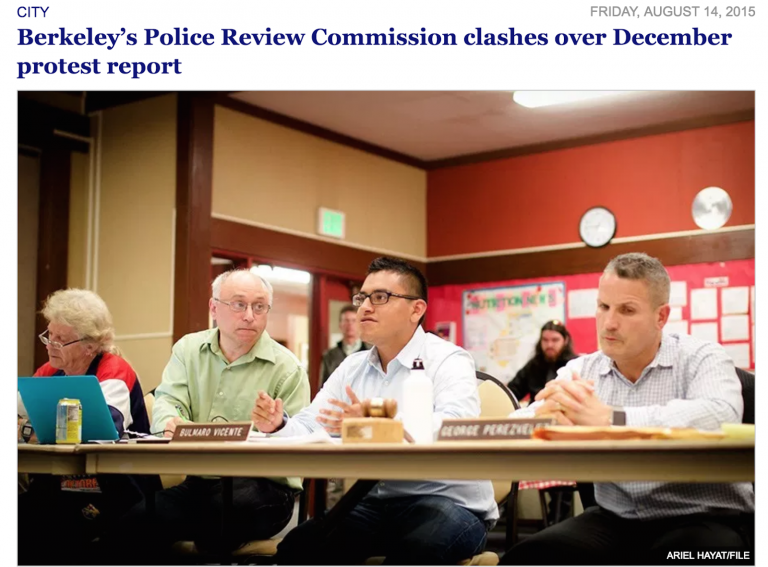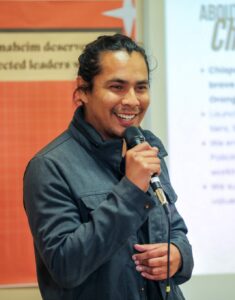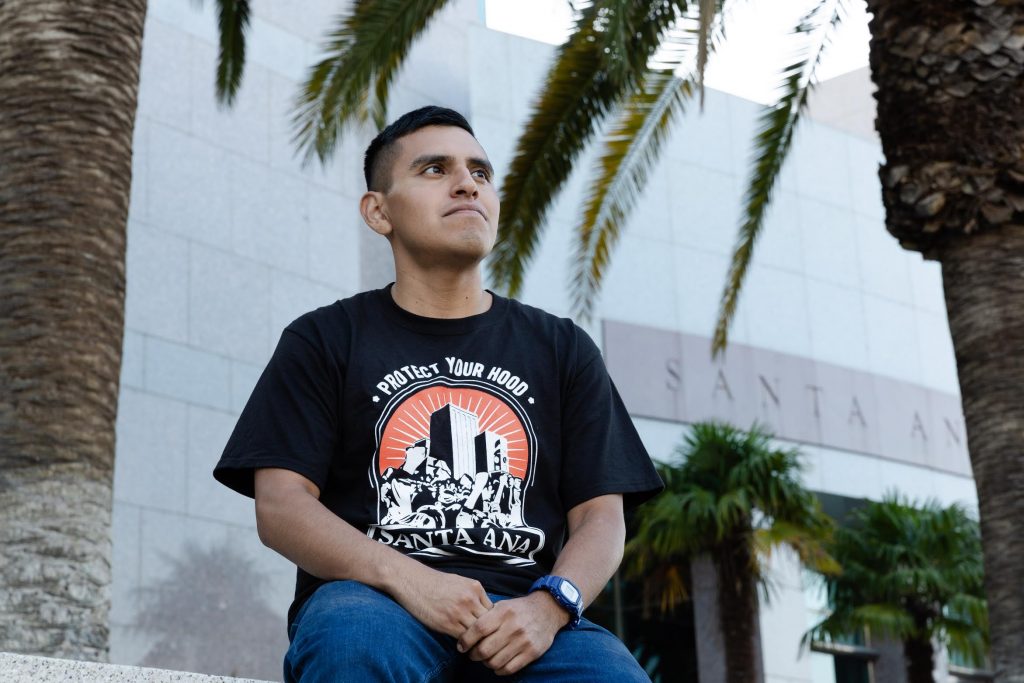I met Boomer last fall shortly after writing a piece about the Santa Ana Police Officers Association’s election spending. He’d read it, and asked David Carbajal, who’s written for Chispa before, to make an introduction.
We spoke over coffee that same week and it quickly became apparent how deep his interested in police accountability was, and how knowledgeable he was in the subject.
At the time I’d been considering the idea of applying for the Soros Justice Fellowship, a highly competitive national fellowship by the Open Society Foundations that supports individuals with criminal justice reform projects. I asked him to apply. Over the next couple of months he worked diligently on his application. He spoke with past fellows and organizers in the field to get feedback on his proposal, and eventually to prepare for the interview. He approached the process with every intention of getting in.
Today, I’m happy to announce that Boomer is joining Chispa as Soros Justice Fellow, a position that will allow him to continue shedding light on the SAPOA’s influence campaigns over Santa Ana’s politics, police misconduct, as well as craft proposals to address all of it. This time on a full time basis and with the backing of a major criminal justice reform institution behind him. Boomer is joined by Theresa Smith of Anaheim, as the another Orange County based 2019 Soros Justice Fellow.
Growing up, Boomer was not into politics very much.
As a teenager, his hope was to be a videogame designer. He still talks about going pro on Halo 3. But his passion for organizing and politics grew out of his experience as a young Latino in SanTana and an eye opening night in Berkeley, where he was appointed to the Police Review Commission at the age of nineteen.
After graduating from Godinez Fundamental High School, Boomer attended UC Berkeley. He was the recipient of numerous scholarships, including one from SAPOA backed Councilman Jose Solorio.

Here is Boomer in his own words:
How did you end up on the Police Review Commission in Berkeley?
I was appointed after a Black Lives Matter demonstration that happened at Berkeley in December 2014. Community members were marching for Ferguson. The police responded violently to us. I witnessed officers strike and brutalized my friends and colleagues. The protestors, including myself, were tear gassed. It was one of the first times I witnessed and experienced police violence up close. Afterwards, the students and community members were upset in the response by the Berkeley Police Department (BPD) and asked for accountability.
At the time, the city police review commission had an open seat. A council member asked for a student to be appointed. I was convinced by my friends to apply and was interviewed. I was appointed the following few days quickly. My orientation was only a few minutes, there was so much going on. The city council called on the Berkeley Police Review Commission (PRC) to do an investigation on the response by BPD. It took almost a year to complete.
What was the outcome of that investigation?
The investigation was sent and passed to the city council. In the investigation report, the commission recommended changes to many of BPD’s policies, including ones around crowd control, use of force, technology, baton use, deployment etc.
The investigation took up a lot of time and work. We had to review over 400 videos and large piles of police reports and policies. We hired an investigator. I stayed in Berkeley that summer to work on the investigation. There was a lot of tension between the commission, the public, and the police. Some of the major victories included continuing the ban of helicopters during protests – an item I motioned and fought for. We came one vote short to recommending the ban of tear gas.
After the investigation, the protestors affected won their lawsuit against BPD, which added much accountability. There was an ok outcome after the investigation and lawsuit, but the journey to that was difficult. A few commissioners and I were scrutinized by the public and police union, due to the work and policies we were advocating for.
At 19, what was your experience like being in the Police Review Commission? For example, what was your relationship with other commissioners who I’m assuming were much older, as well as with officers in the Police Department?
It was difficult at first. I had little experience in policy and city politics before this. The other commissioners were lawyers, business owners, professionals in their careers. I had to learn quickly and fast. Fortunately, some of the commissioners were really helpful in teaching me the role of the commission. They would answer all the questions I had during the meetings. I learned as I went. I established great relationships with some commissioners, who I still talk to this day. It took a while to adjust and get the hang of things, but I had a lot of support from mentors, colleagues, and friends.
I had a very distant relationship with the officers in the police department. I was definitely not their favorite commissioner lol. In the beginning, I kept an open mind and really tried to establish a working relationship with the chief and police. It wasn’t until I went on a really uncomfortable ride along that my relationship with the police department changed. I became more vocal in the lack of accountability and failed leadership of the department. They were not happy.

What happened during that ride along?
A few months after I was appointed, the chief offered me a ride along. I agreed and came in with an open mind, despite my past experiences with police. I was paired with a top lieutenant, Andrew Rateaver.
I heard some officers make some disturbing racist comments in the break room before the shift started. During my ride along, Rat kept questioning me aggressively, telling me I lack experience. He bullied these individuals who were homeless in the park, and even suggested arresting one. Later, he revealed he was the lead officer during the December protest and became defensive, leading me to a baton training I didn’t ask for. After the ride along, he replied to my email sarcastically pointing out an online post i made. The whole experience was so uncomfortable.
I tried to address what happened through the commission, but it didn’t go anywhere. So i decided to go public about my story. It wasn’t until I went on National Public Radio (NPR), that i received an apology from the Chief. I never got an apology from Rat himself. I did hear he retired last year lol. It was due to this experience and many others that my relationship with the police was distant.
After graduating you returned to Santa Ana. Today we know you received a fellowship to continue pursuing police accountability here. But what were your original plans following graduation?
I didn’t have any set plans really. I resigned from the commission shortly after graduation. I took an extra semester to study abroad in Germany. I moved back to Santa Ana last year. I wanted to take a break from politics and organizing. My experience on the commission wore me out and left me really jaded. All the scrutiny and surveillance. It was intense. Back in SanTana, I became unsure of what I wanted to do or if I wanted to stay. I was working on a book, remotely working for a non profit, applying to jobs, really open to anything. It wasn’t until I saw the article published by Chispa regarding the police unions contribution, that I wanted to learn more about how I can help. Things took on from there. I am really glad and still surprised things worked out the way it did. I am excited to come back to this journey, and continue this work back home.
What do you hope to achieve through your fellowship.
I want our community to redefine how we see public safety, the safety and security of our community. Our safety should not be rooted in incarceration, corruption, and political fear. That will never establish community.
I hope my fellowship provides the opportunity for us to take control of our narrative and provide a platform to speak unapologetically about the culture of impunity of our police. I plan to fight for accountability, something far overdue, but extremely needed. I look forward to continue the legacy and work to create meaningful changes to our community.

Hairo Cortes
is the Founder and outgoing Executive Director of Chispa.



